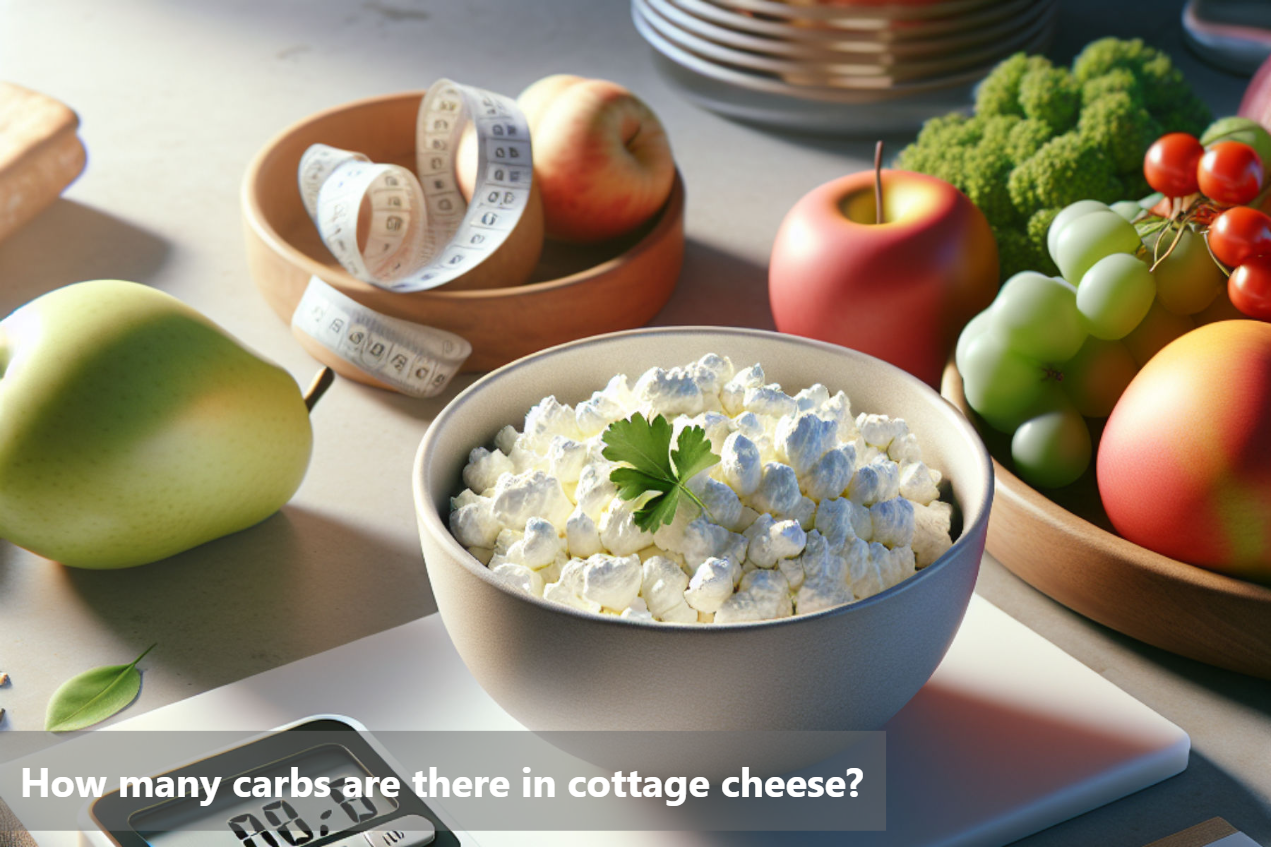
How many carbs are there in cottage cheese?
Cottage cheese has gained immense popularity in the health and fitness community due to its high protein content and low carb content. It is a curd cheese with a mild flavour that can be enjoyed on its own or incorporated into a variety of dishes. Many people choose cottage cheese as a healthy snack or meal option, particularly those following a low-carb diet.
Understanding the carb content of cottage cheese is essential for individuals watching their carbohydrate intake. With varying types of cottage cheese available, such as full-fat, low-fat, and fat-free options, the carb content can differ significantly. By being aware of the carb content in different serving sizes, individuals can make informed choices about including cottage cheese in their diet.

Nutritional Profile of Cottage Cheese
100-gram (about 3.5 ounces) of low-fat (2% milk fat) cottage cheese contains:
Calories |
84 |
Fat |
2.3g |
Sodium |
321mg |
Carbohydrates |
4.3g |
Fibre |
0g |
Sugars |
4.1g |
Protein |
11g |
Calcium |
111mg |
How Many Carbs are in Cottage Cheese?
Generally, cottage cheese is relatively low in carbs compared to other dairy products. A typical serving of cottage cheese contains around 6-8 grams of carbs per half cup, depending on the variety.
For individuals following a low-carb diet, opting for full-fat cottage cheese might be the better choice as it usually contains fewer carbs than its low-fat counterparts. Always remember to check the nutrition label on the packaging to ensure you are aware of the exact carb content.
Additionally, flavoured cottage cheese may have added sugars, increasing the carb count. If you are monitoring your carb intake closely, it is advisable to choose plain or unflavoured varieties.
When it comes to the carb content in cottage cheese, being mindful of the type and serving size you choose can help you stay on track with your dietary goals. Remember, knowledge is power when it comes to making informed food choices.
Tips for Including Cottage Cheese in a Low-Carb Diet
Cottage cheese can be a versatile and nutritious addition to a low-carb diet, providing a good source of protein with fewer carbohydrates compared to other dairy products. Here are some effective tips to help you include cottage cheese in your low-carb meal plan:
Plain and Simple: Opt for plain, full-fat cottage cheese to avoid added sugars or artificial flavourings that can increase carb content.
Enhance with Flavour: Add flavour and variety to your cottage cheese by mixing in fresh herbs, a drizzle of olive oil, or a sprinkle of black pepper for a tasty low-carb snack or meal.
Pair with Low-Carb Foods: Enjoy cottage cheese with low-carb fruits like berries or sliced cucumbers, or incorporate it into salads or wraps for a satisfying boost of protein.
Create Balanced Meals: Combine cottage cheese with healthy fats like avocado or nuts, alongside fibre-rich vegetables, to create a well-rounded, low-carb meal that keeps you full and satisfied.
-
Explore Alternatives: If you are looking to further reduce carb intake, consider trying non-dairy alternatives like Greek yogurt or tofu as a protein-rich substitute for cottage cheese in recipes.
By following these tips, you can easily incorporate cottage cheese into your low-carb diet while keeping your carb intake in check and enjoying the nutritional benefits it offers.

Cottage Cheese Carb Count
Understanding how many carbs are present in different types of cottage cheese empowers you to plan meals that align with your carb intake targets. By choosing between full-fat and low-fat options mindfully, you can optimise your nutritional balance while enjoying the benefits of cottage cheese.
It is crucial to incorporate cottage cheese into a low-carb diet thoughtfully. By exploring creative ways to include cottage cheese in recipes and considering alternatives for reducing carb consumption, you can maintain a healthy eating pattern that suits your lifestyle.
Ultimately, by being conscious of the carb content in cottage cheese and making informed choices, you can effectively manage your carb intake while relishing this nutritious dairy product. Stay mindful, stay informed, and tailor your consumption to your dietary needs.
FAQs
-
How many carbs are in a serving of cottage cheese?
A typical serving of cottage cheese (1/2 cup) contains approximately 6 grams of carbs.
-
Is cottage cheese a good option for low-carb diets?
Yes, cottage cheese is a great low-carb option due to its relatively low carb content.
-
Can I enjoy cottage cheese if I am watching my carb intake?
Yes, as long as you monitor your serving size, cottage cheese can be a delicious and satisfying low-carb snack.
-
Are there any high-carb variations of cottage cheese available?
Some flavoured cottage cheese varieties contain added sugars, which can increase the carb content, so it's important to check the nutrition label.
-
What are some ways to incorporate cottage cheese into a low-carb diet?
Cottage cheese can be enjoyed on its own, mixed with nuts or seeds, added to salads, or used as a creamy topping for various dishes.
This Blog post is an initiative by Lo! Foods, to provide accurate and Nutritionist / Doctor approved information related to Health. Lo! Foods is India's leading brand for Everyday Functional Foods. Foods designed for specific Health conditions or Needs. Lo! Foods also runs India's largest range of Low Carb Healthy Cloud Kitchens, under the brand names of Lo!, ProteinChef, ATH (All Things Healthy) and DiabeSmart.















Leave a comment
Your email address will not be published.